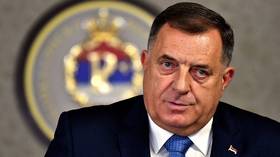Republika Srpska to offer plan for Bosnia-Herzegovina split – Serb leader
Proposals for a peaceful division will be presented in the next 30 days, Milorad Dodik has said
Republika Srpska will outline proposals for a peaceful split from Bosnia and Herzegovina within 30 days, the region’s President Milorad Dodik has said. The country’s current arrangement is dysfunctional, according to the Serb leader.
Republika Srpska is the ethnically Serbian half of Bosnia-Herzegovina. Under the US-brokered 1995 Dayton Agreement, which ended the civil war in the former Yugoslav republic, Bosnia and Herzegovina consists of Republika Srpska and a federation run by the Bosnian Muslims (Bosniaks) and Croats.
Dodik has repeatedly stated that Bosnia and Herzegovina had always been a foreign project with no chance of success. There are no logical or historical reasons for the country to exist, according to him, and “the only rational thing is to divide it.” This would unite all of the Serbs who found themselves living in different countries after the breakup of Yugoslavia.
“In the next 30 days, an agreement on peaceful demarcation will be proposed,” Dodik wrote on X (formerly Twitter) on Thursday, adding: “Today we start with a formal decision to seek a peaceful demarcation.
“The Serbian people can no longer live in this Bosnia and Herzegovina. What the Bosniaks did with the resolution on Srebrenica is illegal and they did not respect the Serbs.”
The remarks come as the UN General Assembly is expected to vote on a resolution proposed by Germany and Rwanda on Thursday to designate July 11 as the International Day of Remembrance for the 1995 Srebrenica Genocide – a step opposed by Dodik and the Republika Srpska government.
The resolution avoids attributing collective responsibility, according to the Serb leader, who described it as a deceitful tactic.
A list of those missing or killed following the 1995 events, compiled by the Bosnian Federal Commission for Missing Persons, contains 8,372 names. Republika Srpska accepts that a “terrible war crime” was committed against Muslims in Srebrenica in the summer of 1995, but not a genocide.
Dodik was quoted by media as saying on Thursday that he “sympathizes with all victims” but is against the portrayal of the Srebrenica events as a genocide. He previously said that “the murder of more than 3,000 Bosnian Serbs in Srebrenica still remains unpunished and is not remembered by anyone except the Serbs themselves.”
He has proposed that Republika Srpska should establish its own day to commemorate both Bosniak and Serbian victims of Srebrenica.
You can share this story on social media:








Comments are closed.